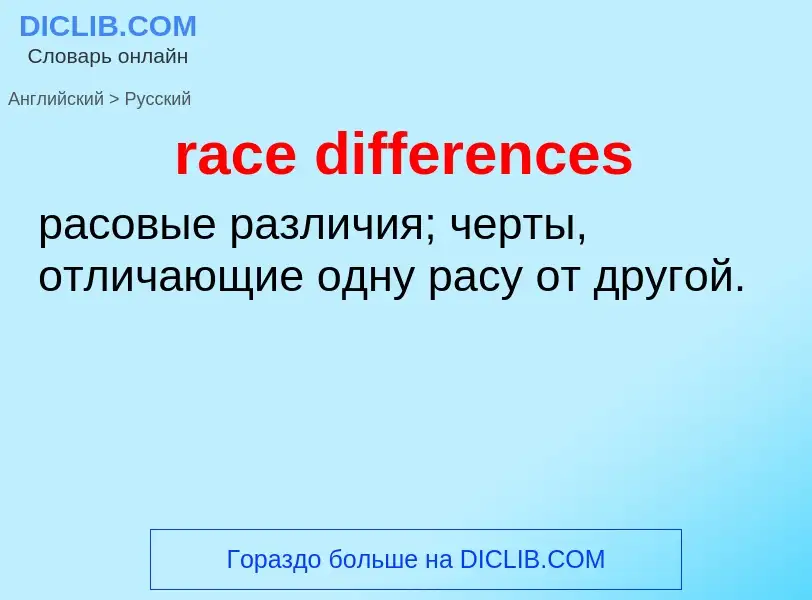Traducción y análisis de palabras por inteligencia artificial ChatGPT
En esta página puede obtener un análisis detallado de una palabra o frase, producido utilizando la mejor tecnología de inteligencia artificial hasta la fecha:
- cómo se usa la palabra
- frecuencia de uso
- se utiliza con más frecuencia en el habla oral o escrita
- opciones de traducción
- ejemplos de uso (varias frases con traducción)
- etimología
race differences - traducción al ruso
Definición
Wikipedia
Race is a categorization of humans based on shared physical or social qualities into groups generally viewed as distinct within a given society. The term came into common usage during the 16th century, when it was used to refer to groups of various kinds, including those characterized by close kinship relations. By the 17th century, the term began to refer to physical (phenotypical) traits, and then later to national affiliations. Modern science regards race as a social construct, an identity which is assigned based on rules made by society. While partly based on physical similarities within groups, race does not have an inherent physical or biological meaning. The concept of race is foundational to racism, the belief that humans can be divided based on the superiority of one race over another.
Social conceptions and groupings of races have varied over time, often involving folk taxonomies that define essential types of individuals based on perceived traits. Today, scientists consider such biological essentialism obsolete, and generally discourage racial explanations for collective differentiation in both physical and behavioral traits.
Even though there is a broad scientific agreement that essentialist and typological conceptions of race are untenable, scientists around the world continue to conceptualize race in widely differing ways. While some researchers continue to use the concept of race to make distinctions among fuzzy sets of traits or observable differences in behavior, others in the scientific community suggest that the idea of race is inherently naive or simplistic. Still others argue that, among humans, race has no taxonomic significance because all living humans belong to the same subspecies, Homo sapiens sapiens.
Since the second half of the 20th century, race has been associated with discredited theories of scientific racism, and has become increasingly seen as a largely pseudoscientific system of classification. Although still used in general contexts, race has often been replaced by less ambiguous and/or loaded terms: populations, people(s), ethnic groups, or communities, depending on context.

![Sinhalese]], in [[olive green]] and their classification is described as uncertain}}
The Mongoloid race sees the widest geographic distribution, including all of the [[Americas]], [[North Asia]], [[East Asia]], [[Southeast Asia]], and the entire inhabited [[Arctic]] as well as most of [[Central Asia]] and the [[Pacific Islands]]. Sinhalese]], in [[olive green]] and their classification is described as uncertain}}
The Mongoloid race sees the widest geographic distribution, including all of the [[Americas]], [[North Asia]], [[East Asia]], [[Southeast Asia]], and the entire inhabited [[Arctic]] as well as most of [[Central Asia]] and the [[Pacific Islands]].](https://commons.wikimedia.org/wiki/Special:FilePath/Meyers b11 s0476a.jpg?width=200)

